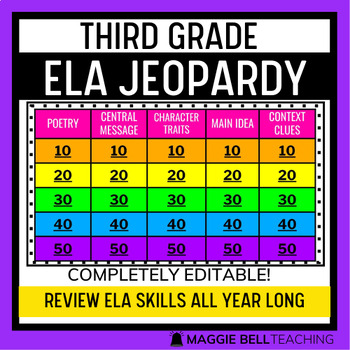Third Grade ELA Jeopardy Review Game (completely editable)
Maggie Bell Teaching
316 Followers
Grade Levels
2nd - 5th
Subjects
Resource Type
Standards
CCSSRL.3.1
CCSSRL.3.2
CCSSRL.3.3
CCSSRL.3.4
CCSSRL.3.5
Formats Included
- Google Slides™
Maggie Bell Teaching
316 Followers

Made for Google Drive™
This resource can be used by students on Google Drive or Google Classroom. To access this resource, you’ll need to allow TPT to add it to your Google Drive. See our FAQ and Privacy Policy for more information.
What educators are saying
It's often hard to find review games for ELA but this was perfect, it did a great job reviewing the skills we have been working on all year.
Description
Practice a wide variety of third reading and ELA skills with this engaging twist on the classic game Jeopardy. This game can be a fun way to review in the classroom or be adapted for a virtual Google Hangout or Zoom meeting with your class.
Every slide is completely editable.
The five categories have differentiated leveled questions that cover the following categories:
- Poetry
- Central Message
- Character Traits
- Main Idea
- Context Clues
Total Pages
Answer Key
N/A
Teaching Duration
N/A
Report this resource to TPT
Reported resources will be reviewed by our team. Report this resource to let us know if this resource violates TPT’s content guidelines.
Standards
to see state-specific standards (only available in the US).
CCSSRL.3.1
Ask and answer questions to demonstrate understanding of a text, referring explicitly to the text as the basis for the answers.
CCSSRL.3.2
Recount stories, including fables, folktales, and myths from diverse cultures; determine the central message, lesson, or moral and explain how it is conveyed through key details in the text.
CCSSRL.3.3
Describe characters in a story (e.g., their traits, motivations, or feelings) and explain how their actions contribute to the sequence of events.
CCSSRL.3.4
Determine the meaning of words and phrases as they are used in a text, distinguishing literal from nonliteral language.
CCSSRL.3.5
Refer to parts of stories, dramas, and poems when writing or speaking about a text, using terms such as chapter, scene, and stanza; describe how each successive part builds on earlier sections.


